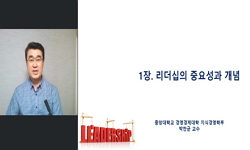Based on the Theory of Reasoned Action, this study develops a comprehensive model to investigate the influence of transformational leadership (TL) on internal knowledge transfer (IKT) within project teams. In this model, TL is considered the independe...
http://chineseinput.net/에서 pinyin(병음)방식으로 중국어를 변환할 수 있습니다.
변환된 중국어를 복사하여 사용하시면 됩니다.
- 中文 을 입력하시려면 zhongwen을 입력하시고 space를누르시면됩니다.
- 北京 을 입력하시려면 beijing을 입력하시고 space를 누르시면 됩니다.

The Impact of Transformational Leadership on Internal Knowledge Transfer: The Mediating Role of Employee Creativity and the Moderating Role of Power Distance
한글로보기https://www.riss.kr/link?id=A109492153
-
저자
Yang, Bowen (College of Business Administration, Kookmin University) ; Lee, Gukseong
- 발행기관
- 학술지명
- 권호사항
-
발행연도
2024
-
작성언어
English
- 주제어
-
KDC
912
-
등재정보
KCI등재
-
자료형태
학술저널
-
수록면
27-48(22쪽)
- DOI식별코드
- 제공처
-
0
상세조회 -
0
다운로드
부가정보
다국어 초록 (Multilingual Abstract)
Based on the Theory of Reasoned Action, this study develops a comprehensive model to investigate the influence of transformational leadership (TL) on internal knowledge transfer (IKT) within project teams. In this model, TL is considered the independent variable, IKT is the dependent variable, and employee creativity (EC) is the mediating variable. Furthermore, the study examines the moderating effect of power distance (PD) on the relationship between TL and IKT within teams. To address these research objectives, the study adopts a quantitative research design, collecting data through a structured survey questionnaire distributed to employees in manufacturing enterprises. The sample comprises 308 respondents, representing diverse roles and hierarchical levels within project teams, providing a robust dataset for analysis. Hierarchical regression analysis was employed as the primary method to test the proposed hypotheses, allowing the researchers to examine both direct and indirect effects within the model and the moderating influence of power distance. Additionally, exploratory and confirmatory factor analyses were conducted to validate the measurement model, ensuring the constructs were appropriately captured. The findings indicate that TL significantly and positively impacts employees' willingness to participate in IKT processes. It demonstrates that TL fosters a collaborative environment conducive to knowledge sharing among team members. Moreover, EC partially mediates the relationship between TL and IKT, highlighting the importance of creativity as a mechanism through which leadership styles influence knowledge-sharing behaviors. Additionally, the study uncovers that power distance negatively moderates the positive effect of TL on employees' willingness to transfer knowledge. In contexts where PD is higher, the positive influence of TL on knowledge-sharing behaviors may be weakened. These findings contribute to the existing body of literature by offering new insights into the interplay between leadership styles, employee behaviors, and knowledge management processes within organizations. They also provide actionable recommendations for organizations aiming to enhance their IKT practices. Specifically, companies can focus on developing leadership strategies that encourage creativity and reduce hierarchical barriers to foster a culture of knowledge sharing. By understanding these dynamics, businesses can improve employee engagement in knowledge transfer activities and optimize the overall effectiveness of IKT processes within project teams.
목차 (Table of Contents)
- Abstract
- 1. Introduction
- 2. Literature Review and Research Hypotheses
- 2.1 The Impact of Transformational Leadership on Internal Knowledge Transfer
- 2.2 The Mediating Role of Employee Creativity
- Abstract
- 1. Introduction
- 2. Literature Review and Research Hypotheses
- 2.1 The Impact of Transformational Leadership on Internal Knowledge Transfer
- 2.2 The Mediating Role of Employee Creativity
- 2.3 The Moderating Role of Power Distance
- 3. Research Design
- 3.1 Data Collection
- 3.2 Variable Measurement
- 4. Empirical Testing
- 4.1 Confirmatory Factor Analysis
- 4.2 Correlation Analysis
- 4.3 Hypothesis Testing
- 5. Conclusion and Discussion
- 5.1 Research Findings
- 5.2 Theoretical Contributions
- 5.3 Practical Implications
- 6. Research Limitations and Future Directions
- References
동일학술지(권/호) 다른 논문
-
- 부산대학교 중국전략연구소(구 부산대학교 중국연구소)
- Hu, Liling
- 2024
- KCI등재
-
- 부산대학교 중국전략연구소(구 부산대학교 중국연구소)
- Cheng, Xiaojun
- 2024
- KCI등재
-
The Impact of Terrorist Attacks on Bilateral Trade between China and its Neighboring Countries
- 부산대학교 중국전략연구소(구 부산대학교 중국연구소)
- Luo, Rui
- 2024
- KCI등재
-
- 부산대학교 중국전략연구소(구 부산대학교 중국연구소)
- Xu, Qiaoyun
- 2024
- KCI등재




 eArticle
eArticle


